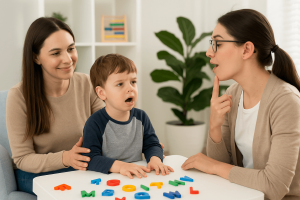Einstein Syndrome and Speech Delays: How Therapy Helps
By Rajini D
Last Updated: March 18, 2024
Welcoming a child into the world brings a kaleidoscope of hopes, dreams, and, sometimes, a few worries. Among these, the development of speech and language in the early years often sits at the forefront of parental concerns. It’s natural to hang on to every babble, waiting for it to morph into a word and then into sentences. But what happens when those words take their time? When the milestones in the baby books seem just out of reach for your little one?
This is where the concept of “Einstein Syndrome” comes into play—a term that might be less familiar to many. It describes children who exhibit a delay in speech but shine brightly in other areas, perhaps solving puzzles with ease or displaying a profound love for music, showing us that development is not a race, but a journey unique to each child.
Also read: The Early Years of Speech and Language
What is Einstein Syndrome?
Einstein Syndrome is a fascinating concept that touches the lives of many families, yet it remains largely misunderstood by the public. This term was first brought into the limelight by American economist Thomas Sowell in the early 1990s. Sowell observed a specific pattern among certain children who, despite being late talkers, exhibited remarkable abilities in areas unrelated to verbal communication, such as music, mathematics, or analytical thinking. This observation led him to coin the term “Einstein Syndrome,” inspired by the late bloomer himself, Albert Einstein, who was said to have not spoken until the age of four.
Einstein Syndrome is a way to describe kids who are really good at some things but start talking later than others. It’s not a medical diagnosis you’d find in a big book of disorders called the DSM-5. Instead, it’s a term used to say that every child grows and learns in their own way. Sometimes, a child might not talk as soon as expected, but that doesn’t mean they aren’t smart or capable of great things.
For parents and those taking care of kids, it’s important to remember that Einstein Syndrome is just one possible path a child’s growth can take. If your child is taking a bit longer to start speaking but is showing talents in other areas, it doesn’t have to be a big worry. This situation just shows that some kids do things in their own time and can still be really good at other things.
Talking about Einstein Syndrome, it’s good to be curious but also careful. Since there’s no official checklist to say for sure if a child has it, it’s best to talk to experts if you’re wondering about your child’s development. Doing this helps make sure your child gets the right kind of support and encouragement they need to do well, even if they’re moving at their own pace when it comes to talking.
Read more: Down Syndrome – Types, Signs and Symptoms
Identifying Einstein Syndrome and Speech Delays
Identifying Einstein Syndrome and differentiating it from other speech delays or developmental conditions is crucial for ensuring that children receive the appropriate support and interventions they need. Recognizing the signs of Einstein Syndrome early on can be both reassuring and a call to action for parents and caregivers.
Signs and Symptoms of Einstein Syndrome
Children with Einstein Syndrome often exhibit a unique set of characteristics. While they might be late in starting to speak, these children typically show exceptional abilities in other areas. Key signs include:
- Delayed Speech Development: Not beginning to speak at the expected age, often significantly later than their peers.
- Remarkable Memory Skills: Exhibiting an unusually strong memory for certain details or events.
- High Analytical Abilities: Demonstrating advanced problem-solving skills or a keen understanding of complex concepts.
- Specific Talents: Showing exceptional talent in areas such as music, mathematics, or spatial reasoning, well beyond what is typical for their age.
Differentiating Einstein Syndrome from Other Conditions
It’s important to distinguish Einstein Syndrome from other conditions that also involve speech delays, such as:
Autism Spectrum Disorder (ASD):
While ASD can include speech delays, it also involves challenges with social interaction and repetitive behaviors. Children with Einstein Syndrome typically do not exhibit these broader social or behavioral challenges.
Childhood Apraxia of Speech (CAS):
CAS is a motor speech disorder where the brain struggles to coordinate the body parts needed for speech. Unlike Einstein Syndrome, CAS involves difficulty making accurate movements for speech despite knowing what they want to say.
The Importance of Professional Evaluation and Diagnosis
Given the overlap in symptoms with other developmental conditions, obtaining a professional evaluation is essential. A thorough assessment by a speech-language pathologist or developmental specialist can help identify whether a child has Einstein Syndrome, another condition, or simply a different pace of development. Such evaluations ensure that children receive specific support and interventions that cater to their unique needs.
In understanding and addressing Einstein Syndrome and speech delays, the key takeaway for parents is not to wait and see but to seek professional advice. While Einstein Syndrome suggests a specific developmental journey with late speech but exceptional skills in other areas, each child’s path is unique. Early intervention and support can make a significant difference in helping all children reach their full potential.
The Role of Speech Therapy in Supporting Children with Einstein Syndrome
Speech therapy plays a pivotal role in supporting children with Einstein Syndrome, guiding them through their unique developmental paths and helping unlock their full communication potential.
How Speech Therapy Benefits Children with Einstein Syndrome
Speech therapy helps kids who are really good at some things but have a hard time learning to talk. For kids with something called Einstein Syndrome, speech therapy does more than help them speak better. It helps them get better at sharing what they think, what they need, and how they feel. This doesn’t just make talking easier. It also makes them feel more confident and helps them make friends and play with others better.
Developmental Milestones Comparison Table
| Age | Typical Development Milestones | Einstein Syndrome Milestones |
|---|---|---|
| 12 Months | Says simple words like ‘mama’ and ‘dada’, Begins to use gestures like waving goodbye | May not use words yet, but understands simple instructions, Shows interest in problem-solving activities |
| 24 Months | Starts to use 2-4 word sentences, Follows simple instructions, Recognizes names of familiar people and objects | Limited spoken vocabulary, possibly less than 50 words, Exceptional understanding of how things work, may solve puzzles meant for older children |
| 36 Months | Can name most familiar things, Understands the concept of ‘mine’ and ‘yours’, Begins to play pretend. | Begins to speak in sentences, often with a clear understanding of complex concepts, Shows advanced problem-solving skills or musical/numerical ability |
Learn more: Autism vs. Down Syndrome: Understanding the Differences
Types of Speech Therapy Interventions
Speech therapists use a variety of interventions tailored to the specific needs of each child. These may include:
- Language Intervention Activities: Through play and interaction, therapists can encourage the development of language skills, helping children expand their vocabulary and sentence structure.
- Articulation Therapy: This focuses on correcting specific sound errors and improving the child’s clarity of speech.
- Social Pragmatic Therapy: Especially beneficial for children with Einstein Syndrome, this therapy type enhances social communication skills, teaching children the nuances of conversation and interaction.
Each of these interventions is designed with the child’s strengths and challenges in mind, ensuring a personalized approach that addresses their unique needs.
Know more: What is the Relation between Communication, Speech and Language?
Speech Therapy Techniques Table
| Technique | Description | Objectives | Age Group |
|---|---|---|---|
| Play-Based Therapy | Uses structured play to encourage speech development. Activities are tailored to the child’s interests to make learning more engaging. | Enhance communication skills and vocabulary expansion. | 1-5 years |
| Picture Exchange Communication System (PECS) | A form of augmentative and alternative communication that uses pictures to teach children how to communicate their needs and desires. | Promote understanding and use of language to initiate communication. | 2-8 years |
| Interactive Language Activities | Activities designed to involve children in using language through games, storytelling, and role-playing. | Increase vocabulary, improve sentence structure, and enhance conversational skills. | 3-10 years |
| Sign Language Introduction | Teaching basic sign language to facilitate communication before verbal skills are fully developed. | Provide a foundation for communication and reduce frustration. | 1-3 years |
| Music Therapy | Utilizes music to improve speech and language skills, such as rhythm and rhyme to enhance auditory processing and speech production. | Improve phonological awareness, rhythm, and timing in speech. | All ages |
| Speech Generating Devices (SGDs) | The use of electronic devices that produce speech based on user input. These can range from simple message devices to complex systems that synthesize speech. | Facilitate communication in non-verbal children and expand communication options. | 3+ years (varies) |
| Phonological Awareness Activities | Exercises and games that focus on the sounds of language, teaching children to recognize and work with sounds in spoken words. | Improve reading and spelling abilities and enhance speech sound discrimination. | 4-8 years |
How Wellness Hub Can Help
At Wellness Hub, we understand that each child’s development is a journey filled with unique milestones and challenges. Recognizing this, we’ve positioned ourselves as a supportive resource for parents who are navigating the complexities of speech delays and seeking effective speech therapy for their children, including those who may be showing signs of Einstein Syndrome.
Our approach at Wellness Hub is deeply rooted in the belief that every child deserves a therapy plan that’s as unique as they are. We pride ourselves on our ability to tailor our speech therapy services to meet the individual needs of each child, creating a nurturing and supportive environment that encourages growth and development. By emphasizing personalized care, we ensure that our therapy sessions are not only effective but also engaging and fun for the child.
We understand that dealing with speech delays can be a stressful time for families, which is why we strive to build a strong, understanding partnership with the parents of the children we work with. Our team of experienced speech therapists is committed to providing the highest level of care, combining their expertise with genuine compassion and empathy. Through this unique approach, we aim to make every family’s journey a little easier and a lot more hopeful.
Moreover, Wellness Hub leverages the latest research and techniques in speech therapy to ensure that our interventions are backed by science and tailored to the specific challenges and strengths of children with Einstein Syndrome. Whether it’s enhancing communication skills, building confidence, or nurturing hidden talents, our goal is to help each child reach their full potential.
Engaging with Your Child at Home
1. Create a Communication-Rich Environment
- Talk to your child about what you’re doing, what you see, and what’s happening around you. Even if they’re not yet speaking, this continuous exposure helps build their understanding and eventual use of language.
- Read together daily. Choose books that interest your child and encourage interaction by asking questions about the pictures and story.
2. Focus on Non-Verbal Communication
- Encourage the use of gestures or sign language as a way to communicate. This can be a powerful tool for children who are late talkers, providing them with a way to express themselves without words.
- Pay attention to your child’s non-verbal cues and respond to them, showing that all forms of communication are valued.
3. Encourage Play and Social Interaction
- Engage in play that stimulates your child’s imagination and encourages them to express themselves. Simple games, role-playing, and interactive toys can be very effective.
- Provide opportunities for your child to interact with peers. Social interaction can stimulate speech and language development in a natural, enjoyable way.
4. Celebrate Efforts and Successes
- Acknowledge and celebrate all attempts at communication, whether they’re words, gestures, or attempts to make sounds. Positive reinforcement encourages more attempts and builds confidence.
- Avoid correcting your child’s speech mistakes directly. Instead, model the correct pronunciation or usage within your response.
5. Practice Patience and Understanding
- Remember that every child’s developmental timeline is unique. Patience and understanding are key. Celebrate the milestones, knowing that progress in speech and language, like all areas of development, happens at its own pace.
- Create a stress-free environment where your child feels safe to express themselves without fear of judgment or pressure.
6. Seek Support When Needed
- If you’re concerned about your child’s speech and language development, don’t hesitate to seek professional advice. Speech therapists can offer tailored strategies and support to meet your child’s individual needs.
At Wellness Hub, we understand the importance of supporting your child’s speech and language development at home. By integrating these practical tips into your daily routine, you can create a supportive and enriching environment that nurtures your child’s growth and development. Remember, you’re not alone on this journey. Our team is here to provide guidance, support, and resources to help you and your child navigate the path ahead with confidence. For more tips on engaging with your child and supporting their development, visit our [Speech Therapy Resources] section on our website.
Conclusion
Children with Einstein Syndrome possess a remarkable potential to thrive, underscoring the importance of understanding and support tailored to their unique developmental journey. Speech therapy emerges as a crucial element in this support system, offering specialized strategies that cater specifically to enhancing communication skills. It’s a tool that not only aids in the development of speech and language but also bolsters confidence and facilitates a deeper connection with the world around them. Parents and caregivers play an indispensable role in this process, advocating for their child’s needs and celebrating every milestone along the way.
At Wellness Hub, we are committed to accompanying families through every stage of this journey. Our dedicated team provides not just therapeutic interventions but a partnership rooted in empathy and understanding. We encourage parents to seek out professional advice and consider how speech therapy can be a transformative resource for their children. With a wealth of resources and expert support, Wellness Hub stands as a beacon for families navigating the complexities of Einstein Syndrome and speech delays. Together, let’s embrace the journey toward unlocking every child’s full potential, fostering an environment where unique talents are recognized, nurtured, and celebrated. Visit our website to explore how we can support your family’s journey and help your child soar to new heights.
Frequently Asked Questions:
1. What is Einstein Syndrome?
Einstein Syndrome refers to a condition where a child exhibits delayed speech development but shows exceptional abilities in other areas, such as music or analytical thinking. It’s not a formal diagnosis but rather a description of a certain developmental pattern.
2. How can I tell if my child has Einstein Syndrome?
Signs of Einstein Syndrome include significantly delayed speech, strong memory skills, early reading abilities, or exceptional talent in areas like music or math. However, it’s crucial to consult a speech-language pathologist or pediatrician for a professional evaluation.
3. Is speech therapy beneficial for children with Einstein Syndrome?
Yes, speech therapy can be highly beneficial for children with Einstein Syndrome. It offers targeted strategies to improve communication skills, fostering both speech development and confidence in their abilities to express themselves.
4. What types of speech therapy interventions are used for Einstein Syndrome?
Interventions may include play-based therapy, language stimulation techniques, and the use of alternative communication methods, like sign language or picture communication, tailored to each child’s unique needs and strengths.
5. How does Wellness Hub support children with Einstein Syndrome?
Wellness Hub offers personalized speech therapy services focused on the individual needs of each child. Our approach emphasizes creating a supportive and understanding environment, empowering children to reach their full potential.
6. Can a child with Einstein Syndrome catch up to their peers in speech development?
Many children with Einstein Syndrome catch up with their peers in speech and language development, especially with early and targeted interventions like speech therapy. Each child’s progress will vary based on their unique circumstances.
7. How can parents support their child with Einstein Syndrome at home?
Parents can support their child by creating a communication-rich environment, encouraging non-verbal communication, engaging in interactive play, and being patient and understanding of their child’s unique developmental timeline.
8. When should I seek professional help for my child’s speech delay?
If you’re concerned about your child’s speech development or suspect they might have Einstein Syndrome, it’s advisable to seek professional advice as early as possible. Early intervention can make a significant difference in a child’s development.
9. What should I expect during a speech therapy session for a child with Einstein Syndrome?
During a speech therapy session for a child with Einstein Syndrome, you can expect the therapist to use a variety of engaging, child-centered activities tailored to your child’s interests and strengths. These may include interactive games, picture books, singing, and even technology-based apps designed to encourage speech and language development.
10. How long does it take for a child with Einstein Syndrome to improve with speech therapy?
The duration of speech therapy varies widely among children with Einstein Syndrome, depending on the individual child’s needs, the frequency of therapy sessions, and how the therapy is supported at home. Some children may show noticeable improvement within a few months, while others might require longer-term support. It’s important to remember that progress in speech therapy is often gradual, and celebrating small achievements along the way is crucial.
About the Author:
Rajini Darugupally
M.Sc., Speech-Language Pathologist (9+ years of experience)
Rajini is a passionate and dedicated Speech-Language Pathologist with over 9+ years of experience, specializing in both developmental speech and language disorders in children and rehabilitation in adults. Driven by a desire to empower each individual to find their voice, Rajini brings a wealth of experience and a warm, genuine approach to therapy.
Currently, at Wellness Hub, she thrives in a team environment that values innovation, compassion, and achieving results for their clients.
Connect with Rajini to learn more about how she can help you or your loved one find their voice.
Book your Free Consultation Today
Parent/Caregiver Info:
Client’s Details:
* Error Message








